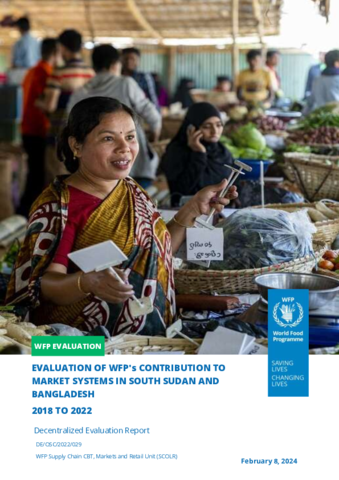
The focus of the evaluation was to understand the way markets operate in South Sudan and Bangladesh through assessing the wide range of Market Development Activities (MDAs) and Retail Engagements Activities (REAs) implemented as part of cash based transfer (CBT) interventions. The objective was to capture the outcomes of market development and supply chain activities and identify ways to evolve/improve mechanisms and opportunities for engaging and partnering with relevant market actors. The evaluation identified lessons learned, best practices, and recommendations to enhance the design and implementation of future market development activities for the benefit of vulnerable people in need of assistance in other countries and contexts.
Key findings:
Relevance: WFP responded to the needs of the community and addressed gaps in market efficiencies through the use of market monitoring and corporate tools when designing and implementing market development activities in each country.
Effectiveness: It was found that market development activities enabled the increased availability of nutritious foods in targeted markets in both countries, and improved product sourcing.
Efficiency: A cost-benefit analysis found that during the evaluation period WFP market development activities generated an estimated annual quantified social benefit of USD 1.9 million in South Sudan and USD 1.5 million in Bangladesh –increased income for retailers and workers, additional jobs created, and cost saving from time spent by people buying food.
Impact: WFP’s market development activities contributed to enabling access to markets that retailers and suppliers would not otherwise have engaged with, expanding businesses, enabling improved product quality and customer service, and increased income. The expansion was often in inaccessible or hard-to-reach areas, and in most cases, markets were created from scratch.
Gender inclusion: Efforts have been made to consider the specific needs of women and marginalized groups, however, there is room for improvement in ensuring their meaningful participation and addressing gender disparities.
Key recommendations that emerged from the Thematic Evaluation include:
Recommendation 1: Hold global strategic discussions to clarify the integration of market development into WFP corporate policies and manuals, especially in relation to the different transfer modalities.
Recommendation 2: Establish corporate indicators within the Corporate Results Framework (CRF) to measure MDA outcomes, ensuring that some indicators measure the gender-related outcomes.
Recommendation 3: Enhance the use of corporate tools, particularly on Retailer Performance, Monitoring and Evaluation, to enable standardization and comparability across countries.
Recommendation 4: Establish a detailed cost-benefit analysis plan prior to starting new market development activities. This plan should outline the monitoring tools to be employed and specify the type of information that needs to be collected.
Recommendation 5: WFP should invest in the sustainability of market development activities to mitigate the effects of humanitarian funding constraints and ration cuts. MDAs’ focus on household and market resilience will contribute to mitigating shocks and operational constraints. Actions must be tailored to each country context.
Recommendation 6: Ensure clarity when discussing ways to mainstream gender and inclusion considerations and how to act on the results of related consultations.
